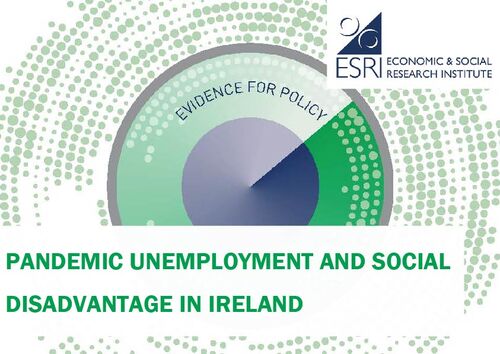In July 2023 the ESRI published a report entitled Pandemic Unemployment and Social Disadvantage in Ireland. In the opening paragraph they note that “Previous research has shown that, on average, lower paid workers were more susceptible to job losses during the pandemic. This relates to the fact that many low paid jobs are in sectors that were particularly hard hit by the public health measures. For example, many businesses in the accommodation and food sectors were forced to close at various points during the pandemic, with little prospect for low-paid workers to continue to work remotely.” (pvii)
Combining data on the recipients of the Pandemic Unemployment Payment (PUP) from the Department of Social Protection and the Pobal HP Deprivation Index at the Electoral Division level the ESRI’s research examined “the economic impact of the pandemic on people living in disadvantaged areas in Ireland”. The Pobal HP Deprivation Index (SA) is a deprivation index developed by Trutz Haase and Jonathan Pratschke and funded by Pobal as a method of measuring the relative affluence or disadvantage of a particular geographical area. A revised index based on Census 2022 data should be launched in November.
On July 13th, Pobal and the ESRI hosted an in-person event at which this research was presented and discussed. The role of the community, voluntary, and local development sectors in responding to the challenges Covid-19 presented in local communities was raised. One speaker noted that a similar approach is required to address other crises, for example, climate change, while the cumulative impact of the 2008 crisis plus Covid-19 plus the dramatic rise in the cost of living on communities experiencing socio-economic disadvantage was noted.
In the concluding paragraph of this report, the ESRI state that “From a policy perspective, the results highlight a number of potential inequalities in the impact of the pandemic with respect to area-level deprivation. Higher PUP rates in more deprived areas suggest that people in these areas are more exposed to the labour market disruption associated with public health restrictions. Many low-paid jobs were disproportionately impacted as a result of business closures during the pandemic, with little prospect for low-paid employees to work remotely. Our results show that once restrictions were eased, there was a sharp decline in PUP recipients in more deprived areas, again suggesting a high reliance on lower paid jobs that were susceptible to pandemic restrictions. The sharp fall in PUP rates in deprived areas following the easing of restrictions, coupled with the shorter average duration of PUP receipt in deprived areas, could also indicate that employees in these areas had less discretion when it came to returning to work. This is an important policy lesson for future events where such lockdowns and restrictions play a role in any government responses.” (p37)
The full report is linked here.
